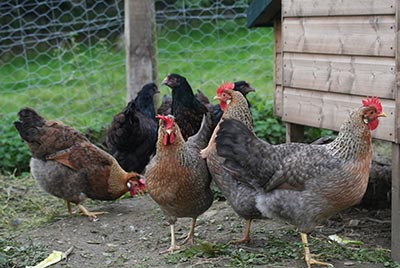So there I was with 4 hybrid mouths to feed, and no idea what to do with them. I asked around locally (we live in a very rural location, so there's lots of local expertise) and bought a sack of 'layers pellets', which provide all the basic nutrition required for hens that are being kept for eggs. The coop is enclosed at night to keep out foxes and mink, and the run is over 2m. high, to keep the hens inside the run during the day (or so I thought).
Here are the 4 hens and the coop and part of the run:
 |
| Chicken run and coop with 4 hybrid hens |
And here's one of the more inquisitive ladies:
 |
| Hybrid hen watching me closely to see if I have any titbits |
Notice that the comb on this hen is bright red, which means that she's in laying condition, and is either laying eggs, or will be very soon.
The coop is large enough for 7-8 birds, so after a couple of weeks I decided to extend my collection a little and hunted around for information on which breed(s) to get. I wanted to act quickly, because it can be difficult to introduce new hens to an established group. Hens have a number of characteristics that depend on breed, so the first thing I did was to decide what characteristics I wanted. The original hybrids were quite quiet, often staying in the coop for extended periods of time, so I wanted to get more outgoing hens for the second group. I also have no (current) intention to breed, so I didn't want a broody type (hens stop laying when they go broody). I also wanted hens that laid brown eggs, simply because I was already anticipating blue ones, and I wanted a spread of colours. Finally, I decided to get a specific breed as opposed to more hybrids, simply because some of the heritage breeds look so good (and I didn't want those 'brown hens' that everyone else seems to have). I searched around and bought this book, which goes through the major breeds and outlines their various qualities:
I got it for 7 euros, and it's money really well spent.
I came up with a shortlist of Marans (a french breed), Rhode Island Reds (american) and Barnevelders (a dutch breed) with the possibility of Leghorns or Spanish Black - both of which lay white eggs - and went off to see what the supplier had in stock. (I also wanted to make sure that the incoming hens were just slightly younger than my four existing hybrids, so that they would have a chance of integrating peacefully.)
I very quickly liked the look of the Barnevelders, and got 3 of those:
 |
| The three Barnevelder pullets |
So here is the current flock of seven hens, with the three black Barnies at the back:
 |
| The magnificent seven |
 |
| 6 fresh eggs |
I think it's wonderful to have REALLY fresh eggs available as and when I want them. They're excellent fried, poached or boiled, but make disappointing omelettes (I have since read that eggs used for omelettes need to be a little older, and that eggs bought in supermarkets are already 4 weeks old when we get them). It's also good to know exactly what the hens are feeding on: I buy organic pellets and the hens get leftover veggies from the garden along with whatever they manage to forage from the run.
The bottom of the coop pulls out for cleaning and the waste (droppings, feathers, straw ejected from the nesting boxes) goes into the compost, which I think makes for a very satisfactory cycle in terms of the vegetable plot.
I recently bought this excellent book of egg recipes written by the master himself:
Here's a recipe that makes unusual use of an egg yolk:
Risotto with Lemon
Ingredients:
Butter and
olive oil for frying.
Minced
onion
Carnaroli
or Arborio or risotto rice
3 times
rice volume of stock (I use home-made chicken stock)
Rosemary
1 lemon,
zested and juiced
1 egg yolk
Parmesan
cheese
Cream
Method:
Melt butter
and oil in a large pan, and soften the minced onion. Add the rice and stir around to coat in the oil. Add the stock a ladleful
at a time, stirring furiously until it is absorbed. Repeat until the rice is
swollen and soft. (maybe 20 minutes). Mix a pinch of rosemary and the lemon zest, adding them
about 10 minutes into the cooking.
Combine egg
yolk, half the lemon juice, parmesan and cream and plenty black pepper.
When the
rice is ready, stir in the egg and cheese mixture and a knob of butter. Taste
for salt and lemon.
No comments:
Post a Comment